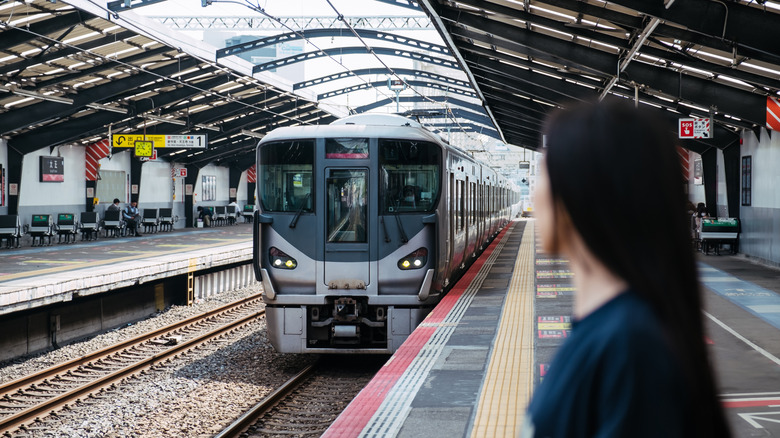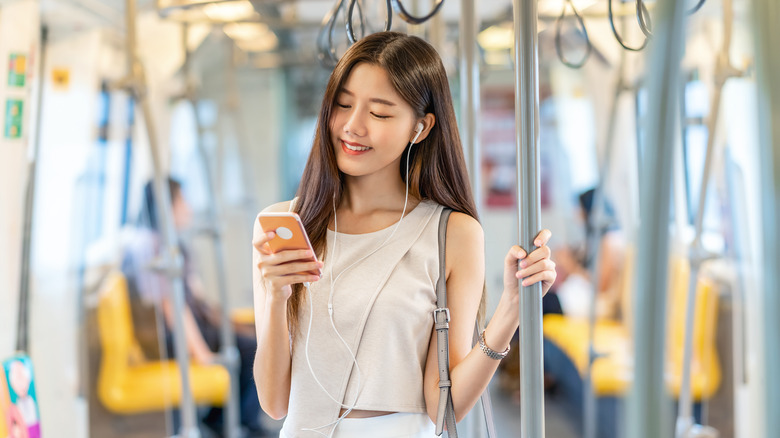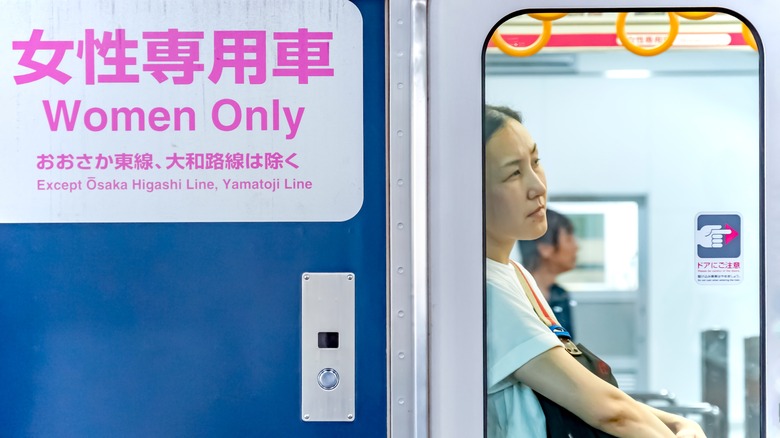This Special Type Of Train Car In Japan Is A Welcome Feature For Women Traveling Solo
Japan is world-renowned for its efficient and expansive railway network, which makes traveling across the country a breeze. From the high-speed Shinkansen to local commuter trains, Japan's railways are integral to daily life and tourism. Around 9 million people use the subway daily in Tokyo alone! However, amidst the hustle and bustle of crowded trains — which even require people-pushers to push commuters into trains during rush hour — a unique feature has emerged that is especially beneficial for women traveling solo and loving it: women-only train cars.
@edinburghfringe Have you noticed the women only carraiges while travelling Japan? There are over 87 train lines with them now and this is why. #traveljapan #japan #japantransport
Women-only train cars in Japan are not new; they actually go back over 100 years. They began in 1912 on Tokyo's Chuo Line, intended for schoolgirls during rush hour. The city of Kobe also introduced women-only trams in the 1920s and 1930s. Post World War II, women and children had special reserved cars, but they were later replaced in 1973 with priority seating for vulnerable groups like the elderly or people with disabilities. The current system emerged in 2000 due to rising sexual harassment cases, called "chikan" (ちかん), or acts of public molestation.
According to Japan Experience, a Tokyo Metropolitan Police survey in the early 2000s showed that ⅔ of women aged 20 to 40 reported being victims of chikan at some point on a crowded train. Unfortunately, these incidents were becoming a significant issue, leading to a public outcry for safer commuting options. Today, most metropolitan train lines in Japan offer women-only cars during peak hours to ensure safer travel for women.
Benefits for solo female travelers
The primary advantage of women-only train cars is, without a doubt, an enhanced sense of safety and security while traveling as solo women can ride without the constant concern of harassment. In Osaka, for example, regular trains at peak times are stuffed at 160% capacity, resulting in the worst cases of harassment against women. Once the female-only train cars were implemented, complaints against chikan decreased by a third in just one year. Crowded public trains are the ideal environment for chikan perpetrators as they can commit their crimes relatively undetected. Since there's no personal space, it's hard to discern who the abuser is, and even worse, it's difficult for the victim to speak out when it's happening on a packed train. Only 10% of women report the crime (via BBC).
Knowing there is a designated space for women provides peace of mind, particularly important for women traveling late at night — when intoxicated and uninhibited people return after partying — or early in the morning when there might be fewer passengers on board. Women-only cars tend to be less crowded than regular cars during peak hours, and passengers can find seats more easily. Moreover, sharing a space with other women can help foster a sense of community and mutual support. For solo female travelers, it can be comforting to be surrounded by other women, especially in a foreign country. A survey found that nearly 70% of women in Tokyo support women-only train cars (via The Japan Times).
Practical tips for using women-only cars
Not all trains have women-only cars, and availability varies depending on the time of day and train line. Currently, women-only train cars exist on 87 lines of 32 railway companies. Check the signage to ensure you board the right one, usually marked in pink with "women only." Floor signage also indicates boarding areas for women-only trains. Some of these trains also permit the entry of young children, people with disabilities, and caregivers, no matter their gender, if they are accompanied by women.
Remember to adhere to designated times when women-only cars are in operation, typically between 6 a.m. to 9 a.m. and 5 p.m. to 9 p.m. Some may be open to all passengers (including men) outside those hours, while others operate as women-only 24/7. Although the cars are designated for women, it's still important to be considerate of fellow passengers — keep noise to a minimum and respect personal space. Take advantage of the comfort and security these special cars provide to relax and enjoy your journey. Read, plan your trip, or simply observe the scenic landscapes of Japan.
Chikan is illegal, and anyone found guilty faces imprisonment or a ¥500,000 ($4,500) fine. There are signs in Japanese train stations to remind passengers that this is a crime punishable by law. If you see someone being harassed, or if you are a victim yourself, contact the police (dial 110) and the railway company. But most importantly, do not be afraid to shout "chikan!"


